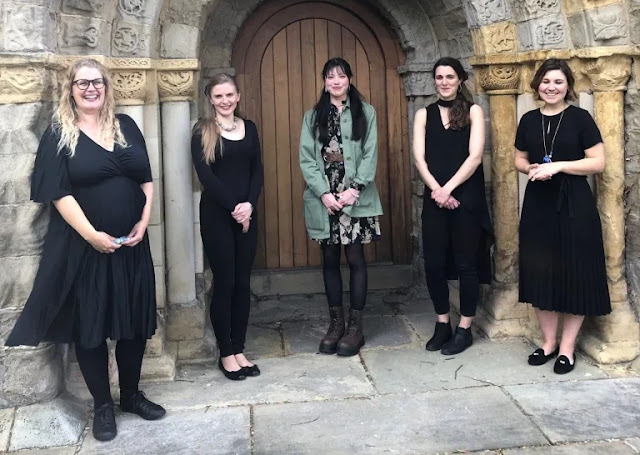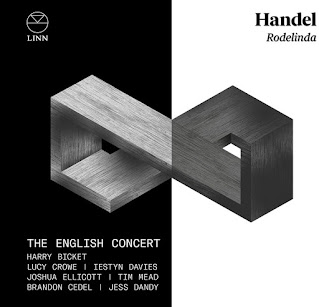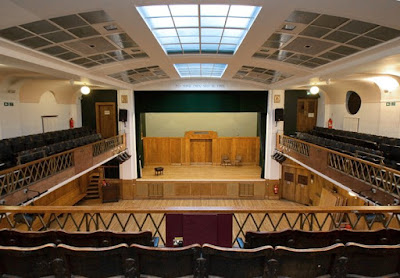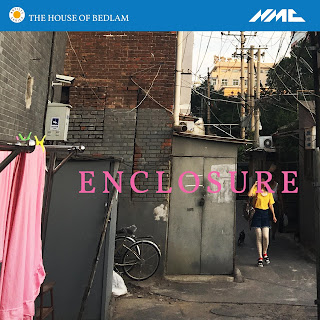The National Centre for Early Music (NCEM) in York has been having a busy time of it. NCEM hosted the final of its 14th Young Composer Award earlier this week, presented in partnership with BBC Radio 3. And NCEM has also announced the details of this year's York Early Music Festival which runs from 12 to 16 July 2021.
For this year's Young Composer Award, NCEM and BBC Radio 3 invited aspiring young composers to create a new work for recorder quartet Palisander based on dance-forms, choosing whatever dance-form they liked across all eras and cultures, from the bransle and the galliard to the Charleston and the tango. The Award was judged at NCEM on Thursday 13 May when the shortlist of entries was performed by Palisander and earlier in the day the shortlisted pieces were rehearsed by Palisander in a workshop with the young composers, led by composer Christopher Fox.
 |
| Young Composers Award winner Delyth Field (centre) with Palisander at the National Centre for Early Music, York |
This year‘s Young Composer Award winner in the 19 to 25 years category is Delyth Field with Kagura Suite for Recorders inspired by Kagura, the oldest form of dance in Japan. The winner in the 18 years and under category is Jacob Fitzgerald with murmuration inspired by the natural dance performed by starlings. Both works will be premiered by Palisander on 20 September 2021 at St John’s Smith Square, London as part of the London Festival of Baroque Music and be recorded for broadcast on BBC Radio 3's Early Music Show. You can catch the film of the awards on NCEM's website.
Looking ahead to July, the theme of this year's York Early Music Festival is one of encounters, most vitally between audience and artists, which seems particularly pertinent at a time when the festival can welcome audiences back to an array of York’s historic venues. A particular emphasis is on the music of Josquin des Prez, celebrating his 500th anniversary.
Soprano Hannah Ely and the Monteverdi String Orchestra kick things off with The Madrigal Re-imagined (and the ensemble's leader Oliver Webber is giving a talk, Un non so che di frizzante: the madrigal as a cauldron of creativity) and then there is violinist Rachel Podger, EEEmerging artists La Vaghezza (specialising in music from 17th and 18th centuries), harpsichordist Steven Devine and Robin Bigwood in The Bach Circle, The Society of Strange and Ancient Instruments' wierd and wonderful The Trumpet Marine Project, and bass Matthew Brook & harpsichordist Peter Seymour in cantatas for bass voice.
There is Josquin from Stile Antico, lutenist Jacob Heringman [see my review of his disc of Josquin transcriptions], and Ensemble Clement Janequin. And the festival closes with Spanish Baroque ensemble L’Apothéose, back to York as part of the Young Artists Showcase. [I very much enjoyed their 2020 Handel disc, see my review] L’Apothéose last appeared in the York in 2019 when they won the York Early Music International Young Artists Competition and The Friends of York Early Music Festival prize. This year they will be recording a CD with Linn Records which was part of their prize.
For those unable to travel to York, the festival will also be available online from 15 to 18 July and will include concerts recorded during the festival alongside commissioned highlights with guests including Gesualdo Six and the Rose Consort of Viols.
Further information from the NCEM website.


























.jpg)

.jpeg)





.jpeg)